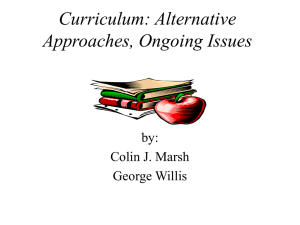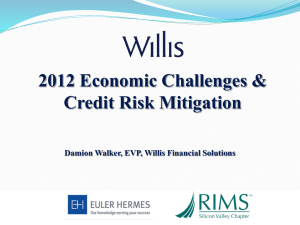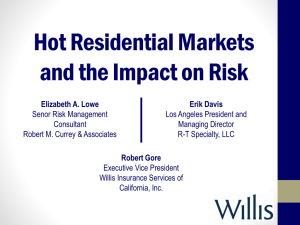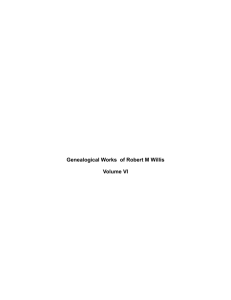Risk Considerations When Working Globally - Frank Wampol
advertisement
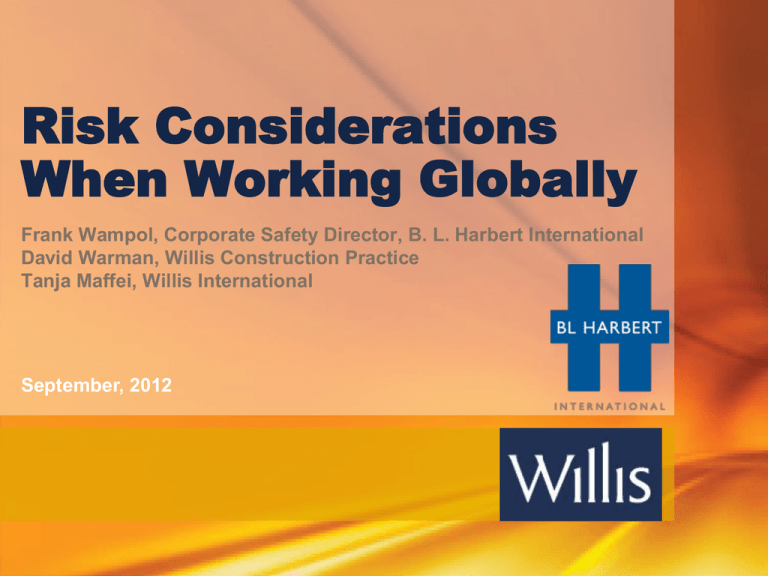
Risk Considerations When Working Globally Frank Wampol, Corporate Safety Director, B. L. Harbert International David Warman, Willis Construction Practice Tanja Maffei, Willis International September, 2012 Today’s Agenda Globalization Considerations When Expanding Overseas Some Examples When to Purchase International Insurance Typical International Program Structures Top International Insurers Emerging Topics and Hot Countries Best Practices Willis International Construction Capabilities Appendix 2 Globalization—New World Order Economic activity and wealth patterns are shifting dramatically. The World’s Ten Largest Economies (Gross Domestic Product, GDP) recent past and looking forward: Rank 2010 Rank 2020 (Forecast) 1. United States 1. China 2. China 2. United States 3. Japan 3. India 4. India 4. Japan 5. Germany 5. Russia 6. Russia 6. Germany 7. United Kingdom 7. Brazil 8. France 8. United Kingdom 9. Brazil 9. France 10. Italy 10. Mexico Source: © 2010 Euromonitor International 3 Globalization—Corporate Risk in the Real World Publication Date 08/27/2012 Source: UPI International Top News 28 punished for building collapse Chinese authorities said 28 people have been punished for a building collapse in November, 2011 that killed six people and injured seven others. Among those held responsible for the incident were Zheng Xinqin, the deputy governor of Chengqu District of Shanwei city, Guangdong province, and Zhuo Hongzuan, director of the district's Urban and Rural Construction Bureau, Xinhua reported Sunday. Punishments ranging from disciplinary warning to serious demerits were handed out to the 28 for the Nov. 22 building collapse in Shanwei. The building that collapsed was being built as a training facility for a bank. Design defects and substandard construction were to blame for the collapse that killed six and injured seven and caused a $1.59 million loss. 4 Considerations When Expanding Overseas Assets and Possible Solutions Protecting People – D&O, WC, EL, AD&D, DBA, K&R, Benefits, Faute Inexcusable, UK Manslaughter Act, Strict liability, auto, war, evacuation, political disasters Insuring Assets – CAR, property, auto, mobile equipment, shipments, surety, trade credit, terrorism, CEN/Political risk, patent/trademark, Revenue Streams – BI, CBI, Supply chain, Reputation Environment – Strict liability, fines and penalties Country risk 5 Considerations When Expanding Overseas Regulatory Compliance/Protectionism Global Taxes – income, people, premiums and claims Litigiousness/Legal environment/Claims Handling Service availability and standards- suppliers, vendors, brokers, adjusters, loss control Liability – contractual risk transfer vs. law, who is responsible, what is standard limit/deductible in each country, good local standard extensions, fines and penalties Professional/E&O, Reps and warranties, Decennial, Reputational risk, Patent/Trademark, Cyber Legal Entity Structure – Partnerships vs. JV vs. Wholly Owned Entities Global Data – exposures, certificates, contracts, audits, claimsstorage, updates, online 24/7 access 6 People Issues- Protecting Your Employees Worldwide SCR, a wholly-owned subsidiary of Willis Limited with over 70 international staff with over 30 years experience, SCR are the world’s leading specialist insurance broker for Kidnap and Ransom and Extortion; High-Risk Personal Accident and Emergency Medical Expenses, Political and Natural Disaster Evacuation and Repatriation and Crisis Management SCR’s Risk Prevention/Security Consultancy services can include: Audit of client’s security, crisis management and evacuation plans Terrorism surveys of construction facilities – often in conjunction with Willis’ in-house team of Engineers to add value to EML calculations Hostile environment and security awareness training for expatriate staff and travelers International Travel Advice SCR’s in-house Risk Prevention and Security Consultants have ex-FBI and former UK Special Forces background and long-standing experience in working with Construction clients globally when you purchase an insurance product through SCR, Insurers will often make a contribution to the cost of the Prevention Service via Risk Prevention Allowance – available as a percentage of the policy premium Contact: Philipp A. Seel - seelp@willis.com 7 People Issues 8 People Issues Know and respect the culture Work force motivation Obtaining safety and quality buy-in Back to the basics! 9 Asset Issues Availability of Materials Availability of Equipment and Spare Parts Local Transportation Challenges Local Logistical Challenges Lack of Municipal Infrastructure Adapting to Local Laws and Customs Safety and Health Concerns 10 When to Purchase International Insurance Is there an owned overseas company? (legal entity, assets, people, sales) No Can cover from home country Yes What is at stake? What do you have to lose? How much control to exercise? At what cost? 1. 2. 3. 4. Compulsory covers Contract requirements Non-admitted illegal Exemptions to non-admitted (aviation, marine, no local market) 5. Yes Local admitted policy Reasons to want local cover (claims service, language, currency, tax, JVs) 11 Typical International Program Structures— Controlled Master Program (CMP) A single insurer issues a Master Policy in the home country (e.g., U.S.) which acts as Excess/Difference In Conditions over the policies issued locally by that same carrier and primary in the absence of local insurances. The local policy will be issued following local laws/regulations known as Good Local Standards. The Master Policy will provide Excess/DIC/DIL coverage bringing the entire program to U.S. standards. Master Policy with DIC/DIL (ACE) Local Territory (United Kingdom) Local Territory (France) Local Territory (Mexico) ACE ACE ACE 12 Current Practice Most global companies today – from the middle market on up—have some version of a controlled master program for both Property and General/Products Liability inclusive of FVWC , Excess EL and AL. Almost the “default” program structure: Cost Leverage Compliance Coverage But not ideal in all respects. 13 Top International InsurersHeadquartered Considerations: Licenses/admitted network Pricing Policy Form Capacity Service timeliness, accuracy, flexibility Loss Control Claims Handling Reporting Premium tax payment Technology U.S. Headquartered: Chartis Chubb CNA FM Global Liberty Mutual Travelers Sentry Torus AWAC Navigators Outside U.S.: ACE Allianz AXA Generali Lloyds Mapfre Mitsui Sumitomo Tokio Marine XL Global Zurich 14 Emerging Topics & Hot Countries Program Structure Options – CMP vs. Project Specific (Brazil, India, China) vs. Regional Approach (LATAM, APAC, EU) Americanization of liability – products, pollution, D&O, fidelity, class actions Regulatory pressures and changes – international compliance, tax, good corporate citizen model Economic challenges – issues with LOCs, surety, trade credit, financials, Globalization of information/Social Media – Reputational risks Inconsistency of social programs structures: uncertain borders, changing workforce, global benefits worldwide Construction Defect, Water Intrusion, Mold, Asbestos, Lead, Chinese Drywall, Acoustical, Trusted external vendors/contractors Sustainability/Green and environmental insurance Canada, Brazil, India, China, Mexico, Mideast, S. America 15 Best Practices Respect local culture and languages Disparity in labor forces and talent by country Be creative in finding solutions Flexibility, coordination and over communication can go a long way Plan for the unthinkable – war, evacuation, terrorism are very common in certain parts of the world A safe worksite has a different meaning in various countries Be prepared for delays Manage the site as a builder not a contractor – be accountable Empower the local project management to be creative and have great flexibility Thinking outside the box must be the norm… 16 Best Practices 17 Best Practices Non-admitted requirements – U.S. carriers may not be able to adjust a claim, issue a certificate or provide loss control if you do not purchase a local policy in the country. Tax implications in case a claim is paid to U.S. parent instead. Cash before cover countries – if premium is not paid before effective date, no policy, no coverage for claims – Japan, Mexico, China and others. Remember that Europe still has a largely unionized work force. Be aware of OFAC regulations for U.S. firms. Obtain your partner’s loss history to gauge the quality of their work & staff. 18 Best Practices Foreign policies in many countries have tacit renewal provisions – need 2-4 months before expiration to cancel or LTA – multiyear agreements (5+ years) where the commission is fully earned at inception and often premium is too Several countries impose a 10 year period for construction defects – Decennial liability policy is common in Spain, France, other Napoleonic code countries, Abu Dhabi and spreading to other countries Use of independent contractors or other non employees in the construction industry can lead to claims against the GL (for lack of safe equipment, working premises, etc.) or DBA policy of the GC if the independent contractors do not purchase their own wc/el insurance Review the JV agreement for who is responsible for risk of loss by line – if this is not clear, insurance policy may not respond – in China leases are often silent on who bears the risk for the property insurance/building European insurance buyers prefer lower deductibles and higher limits than U.S. buyers, Chinese firms purchase lower limits and less insurance than U.S., when working with your foreign partner, discuss who is in charge of insurance 19 Willis and Construction Number one business sector for Willis and therefore a commitment to provide a truly global response Over 750 construction specialists and over in 100 Global Construction Services (GCS) Over USD 3 billion of premium handled annually 12,000 construction clients Largest PPP Practice of any broker – over 60 specialists globally Broker to 6 of the top 10 world’s largest construction groups Specialised claims consultancy operations located within GCS The only broker with North American and Global (ex-NA) Construction Practices Over 98 dedicated construction safety personnel (28 in North America) 20 Willis International Network Key Facts • 120 Countries • Ownership 70%- 41 correspondents • Contractual agreement that network will comply with our standard network rules and operating procedures. We can control and manage the services provided by our network brokers. • The network is managed by a global executive committee • Willis OnLine – Policy Summaries & Country Data • Dedicated Network Teams In Each Country • Detailed Client Survey • Exposure collection and certificate requests online 21 Global Construction Services (GCS) & GCPG– Industry Leaders Over 100 specialists and growing worldwide! Global marketing and a lead supplier to many of the major worldwide insurers and reinsurers Specialist practice groups in Power, Utilities, Oil, Gas and Infrastructure Leaders in Master Construction Programmes (for Contractors and Owners) whether single territory, regional and global Research and Development operations delivering cutting edge material and superior RFP response capabilities Pioneers of a state of the art claims protocol – creating new standards to settling claims PFI / PPP industry leaders – over 500 concessions worked on Specialist claims consultancy – helping Willis clients negotiate better settlements 22 International Projects: Key Risks and Issues Driving a risk analysis strategy alongside services and solutions • Force Majeure: Preferred definitions in the contract • OCIP v CCIP: Contractors resisting more often • Increasing Project Costs: Avoid “value” in the sum insured • Supply Chain Management: Consistent quality controls throughout the supply • Cost Overruns: Can liquidated damages really mitigate? • Claims Settlement: Still taking far too long. A Claims Protocol needed! • Reputational Risk: More important than ever • Extremely Low Margins: Making all contractors nervous • Concession Contracts: (PPP etc.) seamless cover and products are the way forward • Natural Catastrophes: Still testing capacity and cover • Project Finance: No less demanding on contract structure • Global or regional programmes: (for both Owner and Contractor) straitening the curve • No sign of market hardening despite claims mounting up 23 Examples of Recent GCPG Successes Lukoil Russia Global Master Programme – USD 16 billion Qatar Rail Consultancy – USD 30 billion Caspian Pipeline, Kazakhstan to Russia – USD 4 billion Abu Dhabi Airport, UAE – USD 5 billion Asia Pacific LNG, Australia – USD 7 billion Bicentenario Pipeline, Colombia – USD 3 billion Antucoya Mine, Chile – USD 1.5 billion Jurau Hydro Electric Project Consultancy, Brazil – USD 8 billion 24 Appendix—Glossary Admitted – Issued in the local country by an authorized insurer in that country AD&D- accidental death and dismemberment BI – Business interruption BI – Bodily injury CMP – “Controlled Master Program” Master policy issued in the U.S. with corresponding local coverages issued by the same insurer CAR – Contractors All Risks (can sometimes include liability) Compulsory - Insurance required by law on an admitted basis. Usually third-party risks but can be property in certain instances DBA – Defense Based Act DIC/DIL – Difference in Conditions and Difference in Limits – Provides broad coverage and higher limits in the event local coverage is not sufficient Euro Policy – See FOS 25 Appendix—Glossary Fronting – a primary insurer acts as the insurer of record by issuing a policy, but then passes the entire risk to a reinsurer in exchange for a commission. Often, the fronting insurer is licensed to do business in a state or country where the risk is located, but the reinsurer is not. FOS – Freedom of Service contracts issued in Europe to serve EU countries FVWC – Foreign Voluntary Workers Compensation Global – One policy issued in the U.S. to cover exposures throughout the world IRB – The government-controlled reinsurance company that has held a monopoly in Brazil for decades (no showing signs of losing it’s grip on the local insurance market) 26 Appendix—Glossary IPT – Insurance Premium Tax IVA – Value added tax (in Spanish-speaking countries normally) Local – the country outside the U.S. where the exposures exist Non-admitted – Issued outside the local country by an authorized or unauthorized insurer of that country RAQ – Risk analysis questionnaire Tacit Renewal – Policy is automatically renewed by the incumbent carrier unless the required (30/90/180 days) notice is sent by the insured Tariff – A system of set rate regulations enforced by the local insurance industry. (prevalent in Japan/Korea/Brazil as well as other countries) VAT – Value added tax Doingbusinessin.org (Worldbank) 27 Thank You! fwampol@bharbert.com tanja.maffei@willis.com warmand@willis.com
